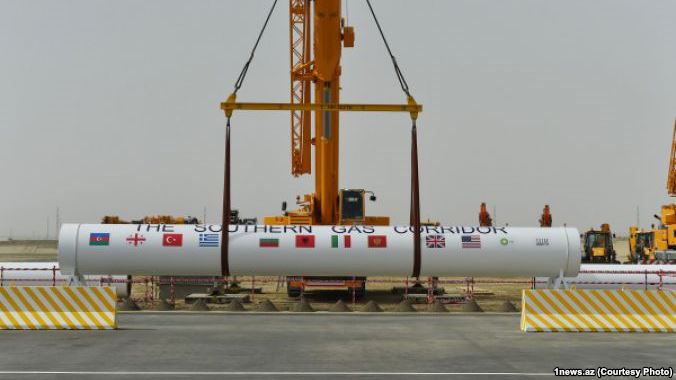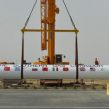
For Now, Italy’s Relations With Azerbaijan Do Not Upset Russia
Publication: Eurasia Daily Monitor Volume: 13 Issue: 35
By:

The steady build-up of Italy’s long-term economic partnership with Azerbaijan is adding an important geopolitical dimension to Rome’s foreign policy. Sitting on the fence, Russia is monitoring the current trade and infrastructure dynamics between Baku, Rome and the European Union. The Kremlin is always sensitive to Western maneuvering in its post-Soviet “near-abroad,” but thus far, at least, the Italian-Azerbaijani relationship is apparently not being perceived as a zero-sum game by the Russian authorities.
Italy recently intensified its cooperation with Azerbaijan by focusing on opportunities in the latter’s energy export–dominated economy and by putting aside objections to Baku’s poor human rights record. On February 5, Italian energy and engineering group Maire Tecnimont concluded a deal with the Azerbaijani state oil company SOCAR to construct a high-density polyethylene factory in Baku (Socar.az, February 5). And just a few days later, on February 11, KT-Kinetics Technology, a process engineering contractor and a subsidiary of Maire Tecnimont, signed an agreement with SOCAR to rebuild the Heydar Aliyev Baku Oil Refinery (Socar.az, February 11).
Italy has been Azerbaijan’s largest trade partner over the past seven years. In 2014, Italian- Azerbaijani commercial turnover was worth some $5.1 billion, twice the size of Azerbaijan’s combined trade with Russia, according to the Azerbaijani State Statistical Committee (Stat.gov.az, July 8, 2015). At the core of the Italian-Azerbaijani economic partnership lies energy policy. Azerbaijan was Italy’s biggest oil provider in 2013 and 2014. In the first eleven months of 2015, the South Caucasus republic ranked second, covering 17.9 percent of Italian crude needs, slightly behind Iraq (18.2 percent) and significantly ahead of Russia (13.3 percent), Italy’s Oil Union reports (Unionepetrolifera.it, January 13).
The Italian state-owned energy producer ENI holds a 5 percent stake in the consortium that developed and now manages the Baku–Tbilisi–Ceyhan (BTC) oil pipeline—the BTC runs from the Azerbaijani sector of the Caspian Sea to the Turkish Mediterranean coast, passing through Georgia (Bp.com, accessed February 22). At its initial stage, ENI was also part of the project to develop Azerbaijan’s Shah Deniz offshore gas field; but in 2004, it sold its 5 percent share to Russia’s energy firm Lukoil, its partner in the venture (Lukoil.com, June 30, 2004). Additionally, the Italian oil and gas services group Saipem, which is controlled by ENI, currently manages underwater services in the Azerbaijani offshore area on behalf of both Azerbaijan International Operating Co. and British Petroleum Exploration (Caspian Sea) Ltd. (Saipem.com, November 3, 2010; April 30, 2014).
More importantly, in December of last year, Italian energy company SNAM, in which Italy’s treasury ministry has a controlling stake, bought from Norway’s Statoil a 20 percent share in the Trans-Adriatic Pipeline (TAP) consortium, equal to the shares owned by SOCAR and BP. TAP will carry 10 billion cubic meters (bcm) of Azerbaijani offshore gas to Europe by 2020, with the possibility of doubling supplies in the future and reaching out to Southeastern Europe through the Ionian Adriatic Pipeline and the Interconnector Greece-Bulgaria (Trend.az, January 19).
TAP is the westernmost segment of the EU-backed Southern Gas Corridor (SGC) initiative, a network of conduits projected to connect the Shah Deniz Two offshore gas field with southern Italy via Georgia, Turkey, Greece and Albania. In addition to TAP, the South Caucasus Pipeline (SCP) and the Trans-Anatolian Natural Gas Pipeline (TANAP) will complete the SGC system. The SCP came online in 2006 and pipes Azerbaijani gas to the Georgian-Turkish border; TANAP is under construction and is expected to link the SCP and TAP at the Turkish-Greek border by 2018.
Though the SGC is one of the priority energy projects for the EU as the bloc tries to reduce its dependence on Russian natural resources, Azerbaijani leaders contend that their gas will not replace Russian supplies to Europe. Their argument is based on numbers, namely on Shah Deniz Two’s inability to match the 147 bcm of natural gas that Gazprom pumped into Europe in 2014 (Notizie Geopolitiche.it, October 30, 2015). Some Russian energy experts go further and claim that there is not enough gas in the Caspian Sea to fill up the SGC pipelines (Il Sole 24 Ore, November 7, 2015). In this sense, they raise Baku’s problems to meet Georgian demand for more gas supplies through the SCP (News.az, February 6).
Baku’s oft-repeated position is that security of gas supplies is more important than the volume; and energy security for Europe can be assured by the diversification of sources and suppliers, which ultimately is the stated goal of the EU’s energy policy (Trend.az, February 11).
The Azerbaijani leadership’s cautious stance toward Russia should not come as a surprise. Despite growing European-Azerbaijani engagement, relations between Baku and Moscow are still important. Both governments are carrying out plans to set up a north-south energy corridor for the export of electricity from Russia to Azerbaijan and onward to Iran (Trend.az, February 10). Furthermore, Baku strongly backs Russian moves with the Organization of Petroleum Exporting Countries (OPEC) to cut oil production and stabilize relative prices—Azerbaijan relies heavily on revenue from oil and natural gas exports, and its finances have been affected by the collapse in crude prices (Apa.az, February 2).
Russia remains Italy’s main supplier of natural gas, even though Russian energy exports to the Italian peninsula decreased considerably in the past two years, hit hard by the sanctions regime imposed by the EU and the United States on Moscow over its armed intervention in Ukraine. But as long as political cooperation between Rome and Moscow remains strong, the Italian partnership with Azerbaijan loses any anti-Russian significance. It becomes, in reality, a strategic tool to transform Italy into an energy hub in the Mediterranean Sea, so that Rome can regain some sort of centrality within the current German-centric EU. In this context, given the minimal supplies that Azerbaijan could directly provide to Europe’s energy needs, in conjunction with the state of the Russian-Azerbaijani relationship, the Rome-Baku economic axis may even be “tolerated” in Moscow.
Instead, the Russian government is more concerned about the EU Commission giving a green light to Gazprom’s plans to double the Nord Stream natural gas pipeline in the Baltic Sea, which would allow the Kremlin to supply Western Europe by entirely circumventing Ukraine. Still, Russia’s attitude to the Italian-Azerbaijani entente, and so to the SGC venture, might dramatically change if natural gas from Iran, Turkmenistan and Iraq were to add to Azerbaijani supplies down the line, increasing the volumes at Europe’s disposal—a prospect that is not so unrealistic.




